Latest Progresses of Silviculture Research in China
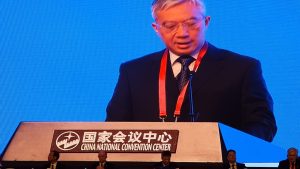
Professor Zhang Shougong, CAF, on screen during the Opening Ceremony
Professor Zhang Shougong, Chinese Academy of Forestry, held the first keynote address at the IUFRO Regional Congress for Asia and Oceania on Monday, 24 October 2016.
As one of the leading scientists in silviculture and forest management in China, Professor Zhang Shougong, President of the Chinese Academy of Forestry, has long experience in establishment of planted forests and sustainable forest management. His research interests cover quality improvement and breeding of larch species, technologies for larch forest management and their application. Read more…
Forest Environment under Changing Climates and Societies
Opening of the first ever IUFRO All Division 8 “Forest Environment” Conference on 23 October, 2016, in connection with the IUFRO Regional Congress for Asia and Oceania in Beijing, China
In his inaugural statement IUFRO Division 8 Coordinator Jean-Michel Carnus highlighted the complete alignment of IUFRO Division 8’s thematic focus with the Regional IUFRO-AO 2016 Congress theme of “Forest Environment under changing climates and societies“.
Recognizing that the participants were the most important ingredients of a successful Congress, IUFRO Vice-President Björn Hånell proudly acknowledged the 20 sessions and 100 presentations of Division 8 that had been fully integrated into the Congress program. He pointed out that the need for knowledge on forest environment had never before been so urgent. And, since such a broad field cannot be mastered alone, scientific cooperation and networking are of utmost importance. Read more…
Systematic Review in Forest Science – Learning from Traditional Forest Knowledge – an Interview
Interview with Maria Veronica Chang, candidate for Master of Environmental Management at Yale School of Forestry and Environmental Studies and participant of IUFRO-SPDC’s Pre-Congress Training Workshop on “Systematic Review in Forest Science – Learning from Traditional Forest Knowledge”.
Please introduce yourself briefly.
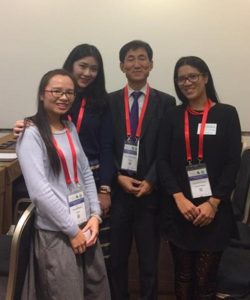
Participants of Pre-Congress Trainings Course. Photo: provided by Veronica Chang (right)
My name is Maria Veronica Chang, candidate for Master of Environmental Management at Yale School of Forestry and Environmental Studies. I have a keen interest in community based tropical forest restoration, particularly in the Neotropics. I am a native of Guayaquil, Ecuador, and I hold a B.S. in Agricultural Economics. Prior to my arrival at Yale, I worked as an environmental educator at Cerro Blanco Tropical Dry Forest in Guayaquil, and as a manager of a sustainable farm in the coast of Manabi, Ecuador. At Yale F&ES, I’m focusing my studies and specialization in tropical forests restoration and management. Additionally, I’m contributing to Yale ISTF (International Society of Tropical Foresters) as treasurer, and as a research assistant for the Map of Life Project. For my master’s project, I conducted my research and work in Azuero, Panama, measuring Agroforestry and Conventional restored plantations in degraded cattle-ranching landscapes. My research will assess the potential of forest restoration programs to incentivize landowners into adopting carbon sequestration systems and improving landscape management practices.
How did you learn about this workshop?
I learned about the workshop through the IUFRO webpage while I was registering for the congress.
Is this the first time for you that you take part in an IUFRO event?
Yes.
Why did you want to participate in this workshop?
My previous research will support local farmers providing data that will help them to adopt sustainable management decisions. However, as a researcher, I think it is important not only to investigate urgent environmental problems and potential solutions. It is also essential to learn the tools to effectively inform scientific findings that would influence the policy decision-making process and therefore, secure the wellbeing of the communities in the long-term.
What do you hope to gain from this workshop?
I hope to gain skills and expertise in conducting future systematic review work concerning relevant forestry and environmental issues. I think there is a great opportunity to get involved and help to establish evidence-based framework that could be used for policy and future environmental agreements.
Would you recommend this workshop to your colleagues?
Definitely, yes!
Thank you for this interview!
Additional information: http://www.iufro.org/science/special/spdc/actproj/twsbeijing16/
Blog post: https://blog.iufro.org/2016/10/23/systematic-review-in-forest-science-learning-from-traditional-forest-knowledge/
Photo:
from left to right:
Minghui Zhang (Seoul National University), Yinghe Huang (Renmin University of China), Prof. Youn Yeo-Chang (Seoul National University), and Veronica Chang (Yale University) during the TFK Session at IUFRO AO 2016 Congress, Beijing
Systematic Review in Forest Science – Learning from Traditional Forest Knowledge
Report by Dr Gillian Petrokofsky, University of Oxford, 23 October 2016
http://www.iufro.org/science/special/spdc/actproj/tws-beij/
Aims of the training
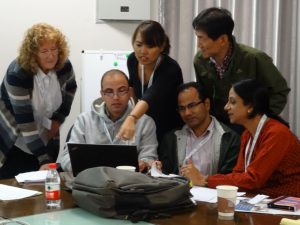
Dr. Gillian Petrokofsky, Biodiversity Institute Oxford, and trainees. Photo: Eva Schimpf, IUFRO-SPDC
The 3-day training workshop introduced participants to systematic review as a powerful tool in evidence synthesis.
The tool is used to improve decision-making and any policy formulation that draws on scientific evidence. The workshop explored examples from forestry and natural resource management.
Participants applied techniques of systematic review to develop mini-Protocols focused on how traditional knowledge forest could inform current forest management strategies/policy. Read more…
Interview with Professor Zhang Shougong, Chinese Academy of Forestry (CAF)
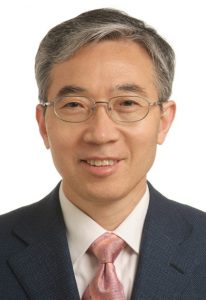
Professor Zhang Shougong, Chinese Academy of Forestry (CAF)
Keynote speaker at the IUFRO Regional Congress for Asia and Oceania –
Forests for Sustainable Development: The Role of Research
Professor Zhang, the IUFRO Regional Congress for Asia and Oceania 2016 is jointly organized by IUFRO and the Chinese Academy of Forestry. This is the first Congress of its kind to be held in the region of Asia and Oceania and will offer an extraordinary opportunity for enhancing forest science cooperation. You are one of the leading scientists in silviculture and forest management in China and have a long experience in the establishment of planted forests on the one hand, and sustainable forest management on the other hand. The Congress will particularly focus on these two areas with its themes “Planted forests for fostering a greener economy”, and “Sustainable forest management for enhanced provision of ecosystem services”. Read more…
CITES CoP17 – Major Consensus on Stronger Actions to Combat Illegal Wildlife Trade
IUFRO-led Global Forest Expert Panel on Illegal Timber Trade Informed about Current Assessment
The 17th meeting of the Conference of the Parties (CoP 17) to the Convention on International Trade in Endangered Species of Wild Fauna and Flora (CITES) took place from 24 September to 5 October 2016 in Johannesburg, South Africa. It was the largest CITES meeting to date, with more than 3,500 participants representing 152 governments, international organizations, non-governmental organizations and media. (http://www.iisd.ca/cites/cop17/) Read more…
Interview with Don Koo Lee, Professor Emeritus, Seoul National University, Republic of Korea
Keynote speaker at the IUFRO Regional Congress for Asia and Oceania – Forests for Sustainable Development: The Role of Research
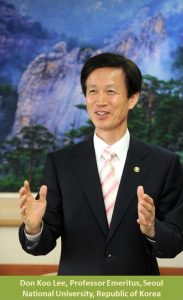 Professor Lee, the overarching theme of this IUFRO Regional Congress for Asia and Oceania is “Forests for Sustainable Development: The Role of Research”. When you gave your opening speech as President of IUFRO at the XXIII IUFRO World Congress 2010 in Seoul, you stressed the importance of sustainability, equity, growth and development and the need to understand that “Forest is our life, our hope, and our future.”
Professor Lee, the overarching theme of this IUFRO Regional Congress for Asia and Oceania is “Forests for Sustainable Development: The Role of Research”. When you gave your opening speech as President of IUFRO at the XXIII IUFRO World Congress 2010 in Seoul, you stressed the importance of sustainability, equity, growth and development and the need to understand that “Forest is our life, our hope, and our future.”
Q: What would you say has been achieved in the quest for sustainable development since the 2010 IUFRO World Congress?
A: Since then the important role of forests for life, hope and future has been further strengthened internationally by collaborative partnership activities, (e.g. co-research, advanced studies, site visits, trainings, conferences, etc.) especially in Asia, Africa and Latin America, as well as nationally by the Forest For Life National Movement in Korea. Read more…
IUFRO Spotlight #40 – Biological Invasions: An Undesired Effect of Globalization
Increasingly, the trend of globalization causes many species to be moved around the world and into areas in which they have never before existed.
Unfortunately, when organisms are moved out of the regions where they evolved and transported to new regions where there are few or no natural limiting factors – predators, as an example – populations can sometimes explode with profound impacts on the new and vulnerable territory. Read more…
Governance and Forest Landscape Restoration at IUCN World Conservation Congress 2016
Summary on a session held at the IUCN World Conservation Congress, Hawai’i, USA, on 3 September 2016
The purpose of the session was to better understand governance challenges related to forest landscape restoration (FLR) implementation, and options to address these. The session was organised as follows: Stephanie Mansourian introduced the subject of governance and FLR. She was followed by four case study presentations: Nadine Crookes from Parks Canada, John Crockett from the US Forest Service, Gérard Rambeloarisoa from the Madagascar Biodiversity Fund and Chris Buss from IUCN, and then 20 minutes of questions and discussion. A total of 30-40 participants attended the one hour session. Read more…
Interview with Professor Makoto Yokohari Graduate School of Engineering, The University of Tokyo, Japan
Keynote speaker at the IUFRO Regional Congress for Asia and Oceania – Forests for Sustainable Development: The Role of Research
The Role of Forests in Urban Green Spaces
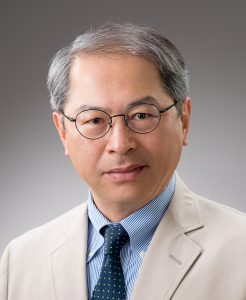
Professor Makoto Yokohari, Graduate School of Engineering, The University of Tokyo, Japan
Professor Yokohari, landscape and urban planning, urban ecology, and ecological landscape design are at the core of your academic interests. The IUFRO Regional Congress for Asia and Oceania draws attention to the particular role that forests play for the sustainable development in urban and peri-urban areas and has identified “Urban forestry for human health and community well-being” as one of its key themes.
Q: Urban green spaces have significantly gained in importance worldwide in view of rapid urbanization of society and the development of megacities. What are the major benefits of urban green spaces in general?
A: Three clusters of ecological functions, or benefits, can be listed, which are “human comfort”, “conservation of physical environment” and “conservation of biological environment”. The first cluster includes functions as landscape conservation and recreational uses, the second includes microclimate control and water retention, and the third includes conservation of ecosystems and biodiversity. Read more…
